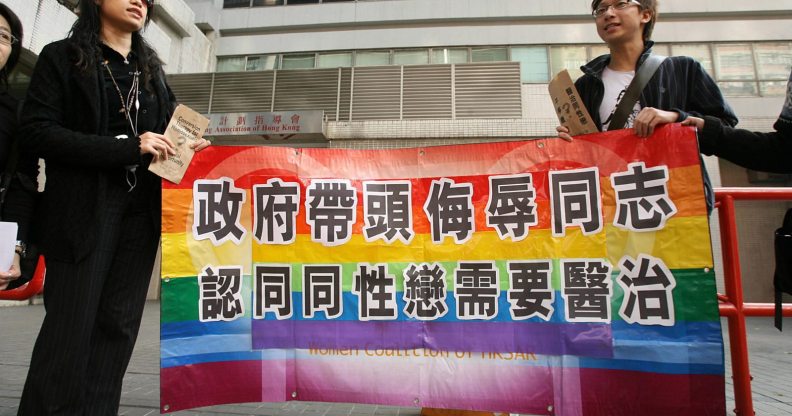Transgender in China: Self-surgery, illegal hormones and Buddhist ‘cures’

LGBT youth take part in a parade in Hainan province in China (MIKE CLARKE/AFP/Getty Images)
Transgender people in China are risking dangerous surgery and black-market hormone treatments because it’s “impossible” for them to access healthcare, a new report from Amnesty International reveals.
The report, “I need my parents consent to be myself”: Barriers to gender-affirming treatments for transgender people in China, was released on Thursday (May 9) and contains interviews with 15 trans people in China.
Widespread discrimination against trans people, a serious lack of information about accessing gender-affirming treatment and restrictive eligibility requirements on who can access healthcare are the three main barriers to getting care for trans people, Amnesty’s report found.
Doriane Lau, Amnesty’s China researcher and the lead author of the report, told PinkNews that “lax regulations” around conversion therapy also contribute to how China is “failing” transgender people.
“Currently there is no law banning conversion therapy in China,” Lau told PinkNews. “Even though a court in China ruled in 2014 that one of the biggest search engines must remove conversion therapy advertisement, conversion therapy is still very common in the country due to lax regulations. An interviewee’s parents even sought help from private institutions that claimed to ‘cure’ transgender identities.”
“An interviewee’s parents even sought help from private institutions that claimed to ‘cure’ transgender identities.”
— Doriane Lau, Amnesty’s China researcher
Of the 15 trans people Amnesty interviewed, 12 are trans women, two are trans men and one is a non-binary person.
Fengling, 21, is one of the trans women interviewed by Amnesty. In 2016, while living in Beijing, her anxiety worsened and she went to see a doctor, who she asked to “cure” her and “convert” her back to a “normal” person.
When the doctor told her it was impossible, Fengling came out as trans to her parents and asked them for help.
They sought help from private institutions, including one that claimed to “cure” transgender people using Buddhist teachings.
Fengling was treated for six months, and became suicidal and depressed. Eventually she called a psychological helpline in Beijing.
Lau told PinkNews that Fengling wasn’t their only interviewee who sought help through phone counselling. “However, the few hotlines for LGBT people in China are all operated by NGOs running on little resources or funding,” she added.

China suffers from regular LGBT+ crackdowns (STR/AFP/Getty)
Severe restrictions on who can access healthcare
In China, individuals seeking gender-affirming surgery must first be diagnosed with “transsexualism,” which is classed as a mental illness. They must also be unmarried, be over 20 years old, have a clean criminal record, have had a proven urge to undergo gender-affirming surgery for five years and have their families consent. They must also have had a year of psychological and psychiatric intervention that has been “ineffective.”
According to Amnesty’s report, gender-affirming treatment is categorised as plastic surgery in China. This means that it is also only available to those with the money to pay for it.
Widespread discrimination against transgender people
Although the precise size of the trans population in China is not known, Amnesty’s report found estimates of the number of trans people living in China that varied between 100,000 and four million.
Most of the academic discussion on healthcare services provided for trans people in China has focused on surgery, Amnesty found, which is often considered the only or the best “cure” for “transsexualism.”
Additionally, very often “transsexualism” is translated into Chinese as “sex-change craving” (yixingpi 易性癖), a term with a strongly negative connotation.
The stigma influences both policymakers and trans people’s families – one of the reasons that few trans people in China come out to their families is the fear of rejection. But family consent is required for gender-affirming surgery, demonstrating how the stigma around being trans impacts on trans people’s lives.
Lau told PinkNews: “Transgender people in China face prevalent discrimination in school, at work, at home and in the healthcare system. The lack of a discrimination law means that there is no way trans people can seek redress when they face discrimination. The lack of public awareness in the diversity of gender identities and expressions also perpetuated the stigma facing trans people in China.”
Dangerous self-surgery
Because it’s so hard to access public healthcare, many trans people in China buy hormones from the internet and self-medicate. The research found that this included buying medication through social-media chat groups, online shops and via overseas surrogate shoppers.
Two of Amnesty’s interviewees also reported carrying out gender-affirming surgery on themselves, because they weren’t able to access this through the Chinese medical establishment.
“I thought I was an abnormal person. How could I explain this to my family?” Huiming told Amnesty. She attempted to remove her genitals, bleeding so badly that she was rushed to hospital. Luckily she survived, and In 2017, Huiming travelled to Thailand for gender-affirming surgery.
According to the report, in March 2019, the Chinese government accepted recommendations by the UN Human Rights Council to legislate to ban discrimination against LGBTI people.
“The Chinese government can show it is serious in addressing discrimination against the LGBTI community by removing the barriers transgender people face when trying to access safe gender-affirming treatments,” said Doriane Lau.

